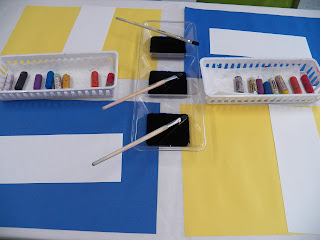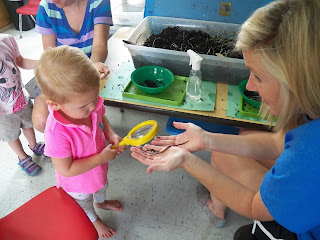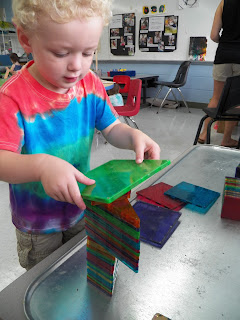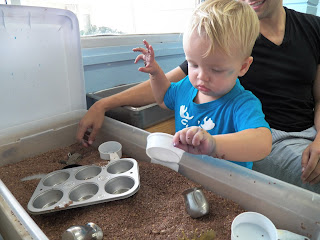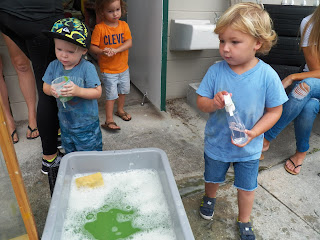Too often, parents/caregivers/teachers underestimate children when it comes to their problem solving abilities.
Conversely, when it comes to "Academic skills", too often adults overestimate the child's development.
I usually disappoint parents when they find I am not that impressed with their child's ability to name colors, letters, numbers, etc...While, memorization is a fantastic learning tool, I am much more akin to appreciating the child's capacity for something deeper.
I am eager to observe children problem solving...I want to understand their process in a deeper way. I want to know my role as both a teacher and parent in a more effective way.
How does a child develop their sense of Agency?
"A resilience, an understanding that life is full of setbacks, but eventually, I'll get there" sort of attitude.
So, I must take you with me on my journey.
I have changed and hopefully strengthened in my years of teaching. I hope that is every teacher's goal; to reflect on his/her teaching and strive to do it better each and every year, month, day, hour.
I am under no illusion that I get it right each class. I only hope to stay "open" to learning from the children and in my special experience, to learn with and from the parents/caregivers.
Feel free to interchange the word parent(ing) with teaching because ultimately, I also want to be a better parent each and every day, as well.
One of the roles I have at Wonder Studio is to attempt to get everyone on the same page in regards to the educational environment we hope to provide.
So, last year, I started to "up my game" and prepare mini teaching lectures on child development as well as offer an understanding behind some of the experiences I prepare each day.
This year, I am coming in strong with the adults and urging them to let the kids "fail" a bit.
The book: The Gift of Failure by Jessica Lahey has been a tremendous validation to much of the research I had previously read regarding this topic.
Chapter 3: Less Really is More
is really one of my favorite chapters.
Some of the headers include:
"Controlling parents give lots of unsolicited advice and direction."
"Controlling parents provide solutions or the correct answer before the child has had a chance to really struggle with a problem."
Wait. Then...please wait a bit more.
Try and learn about your child's wait time.
I began to really consider this concept of "waiting" when my daughter was learning to read.
She needed far longer time to figure out a new (or familiar word, even) than I anticipated.
If, I was over eager and helped her too quickly, I stole her opportunity for learning away from her. It was visibly apparent that she would lose confidence when I intervened.
Wow, was I missing some beautiful moments!! When, I finally decided to shut up and let her flounder around, after some "mistakes" and time...she would get it all on her own.
Now, my kids are a bit like me...in that they are sort of dramatic, they yell, cry, basically, they get "Pissed off" when things get hard.
It's rare that my stepping in makes the "problem" better.
Typically, it's when I step away or say, "You'll get it, keep trying," that they do "get it".
It's soooooo hard to NOT help your children. And, it feels wrong to not step in, it feels mean, it feel unkind.
I may seem like a real hard ass but I actually am a big pile of Mushy mommy who hates to see any child/person in pain.
But, I always return to this:
Children are Strong.
Children are powerful.
How do I show children (and adults) that I really believe this?
Sharing is one of those topics that gives parents A LOT of strong feelings.
We don't want our child to be a bully and we don't want our child to be bullied.
I ask parents to try really hard to not step in when children take toys from one another (unless hitting or biting is about to happen).
Below is a quick video demonstrating 2 little girls "working it out."
So, J. (our Brunette) had made previous attempts to play with the fish that our Bright Pink Shirt little girl had been "working" with and she had been unsuccessful in her attempts to procure these fish. (Meanwhile, plenty of other fish were available to her, but I like that she really wanted to experiment with Bright Pink Shirt Little Girl's fish.)
When the struggle begins, J. has confidence that she is going to hold on to these fish even as Bright Pink Shirt Little Girl really gets in there to pry them from her hand.
J. says, "that's not yours"... I repeat her words because, sometimes, in the heat of the moment, children won't hear what the other child says.
Bright pink shirt little girl looks at me, looks at her mom who you can hear say, "It's OK." (Perfect choice of words!) And, then she let's go. (And, let's off some steam by splashing water in the water table...thank goodness for sensory release experiences!!)
A problem that these girls struggled through. J. was intent on solving this issue and she eventually persevered. I wish I had video demonstrating the previous "failed" attempts.
Video/photography is an effective teaching tool for both teachers and students.
I do wonder if my "sportscasting" placed an expectation on bright pink shirt little girl.
Next time, I think I might Wait longer.
There will always be a next time. Opportunities to problem solve are happening all the time.
We just have to be open to recognizing them.
Learning to work with one another through our differences is probably a really, super important skill.
As the mom said, in the video, "It's ok."
It is ok to try and get what you want and it's ok to hold on to what you already have.
Wow. We can learn a lot from our children.




